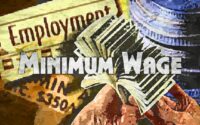EMPLOYER’S LIABILITY DURING THE PERIOD OF NATIONWIDE LOCKDOWN
This article is written by Kashish Goyal, from Mody university of Science and Technology, Rajasthan and curated by Shruti Chaudhary, from Dr. Ram Manohar Lohiya National Law University, Lucknow.
There is a nationwide lockdown in the whole country since March due to the pandemic (Covid-19). This crisis has majorly affected the employer and employee. Even at the workplace, workers are facing problems; they have to adopt precautionary measures before going for work due to infection. This pandemic has resulted in affecting the payment of wages to the employee. Many guidelines have been issued by the ministry regarding the salary of the workers but they have not been implemented yet. There is so much confusion about whether the employee will be entitled to a salary or not?
It is the duty of every employer to pay wages in exceptional circumstances when the employee is not able to work. But on the other hand, it is also true that due to the crisis, the employer is also the one facing many problems as he has to keep his employees busy at work with his own responsibilities.
The Ministry of Home Affairs has issued orders since the lockdown has begun:
On 17th March 2020, the Government of India informed all the employers of establishments neither to cut the wages nor to terminate the employees. Many states have followed the guidelines completely. There is another point which was stated i.e. all the employers if they are not able to work at their workplace, will be treated as if they are on their work.
One of the important orders issued by the Ministry of Home Affairs came on 29th March 2020, which is issued under the Section 10(2) (l) of Disaster Management Act (states that it is the duty of the Ministry of Home affairs to give directions or guidelines to the government regarding the measures which they have to take to meet the unforeseen disaster). Through this order the government want to ensure that all the employers are making payments to their employee without any deduction. It does not matter whether they work in any industry or any shops.
Apart from these orders, there are some general duties which should be properly fulfilled by each employer during any type of disaster and these are:
- If the employer will not pay the salary during this time, all employees will face financial crises. It is the supreme duty of the employer not to terminate the employees and pay the salary without any deductions; otherwise, it will affect the financial condition of the employee.
- If in case the employee joins the duty because it is impossible to work from home, then it is the duty of the employer to provide the safety measures and essential facilities that are necessary for good health.
- There are some establishments, where the employee can be granted work from home. Every employer should provide the guidelines for work from home and they will be deemed as on duty.
- There is one more pandemic that is being faced by the government i.e., infodemics where fake news is shared among the people. It is the duty of the employer to provide authentic information related to employment.
Another order came on 17th May 2020, withdrawing the order dated 29.03.2020 which made it mandatory for all the employers to pay salary and wages. The new order dated 17.05.2020 prescribes that the employer can act according to the employment agreements and can apply the legislation related to labour and employment for any matter includes lay off, retrenchment, employment, wages etc. There was a reason behind for withdrawal of the previous order i.e. many unions, employers, and various companies filed a petition and claimed that the court has to take into consideration the financial condition of the employers also. The petitioner said that if they make payments, it will lead to the closure of many firms which will result in economic crisis. They raised many grounds under Article 19 of the In Indian Constitution i.e. Freedom to carry and occupation or trade or if in case they are forced to pay wages then it might lead to the creation of problems in unions.
In one of the Judgements of the Supreme Court in a case named “Executive Committee of Vaish Degree College, Shamli and Ors. V. Lakshmi Nariran & Others, the court justified that, when the situation of the country is unpleasant and adverse and a large number of people are unemployed and the employees are unable to meet their daily expenditure, there should be a policy where the employers have to make payments to protect the right of livelihood of employees.
There is a clause of Force majeure under the Indian Contract Act 1872 which states that the company has an obligation to perform its duty towards the employee if the situation of the country is terrible and adverse. It provides that the companies are bound to perform their duties.
Furthermore, the guidelines which are issued by the government, if not followed and implemented then the responsible entity may be liable to penal provisions.
- Under section 188 of the Indian Penal Code 1860, the offender will be imprisoned for 6 months with a fine of Rs.1000, if the person does not act according to the government restrictions and guidelines.
- Under section 51 of the Disaster Management Act, 2005, if the guidelines issued by the government are not properly implemented by any person, then he/she will be liable to be imprisoned for 1 year.
The Supreme Court issued some directions on 12th June in which they asked the employers and employees to negotiate with each other as the industry needs both workers and employers. Because they are some industries that can bear the financial burden to pay the wages but some are going through the financial crises themselves because of the pandemic. Or if in case they don’t want to settle the dispute they can contact the labour authorities. – Justice Ashok Bhushan, Sanjan Kishan Kaul, and MR Shah.
It is thereby concluded that, if the government wants to take appropriate action regarding the payment of wages they need to act upon the conditions and circumstances of both the parties. They can’t put the burden on the employer only. The government has to take such measures which lead to justice for both.


